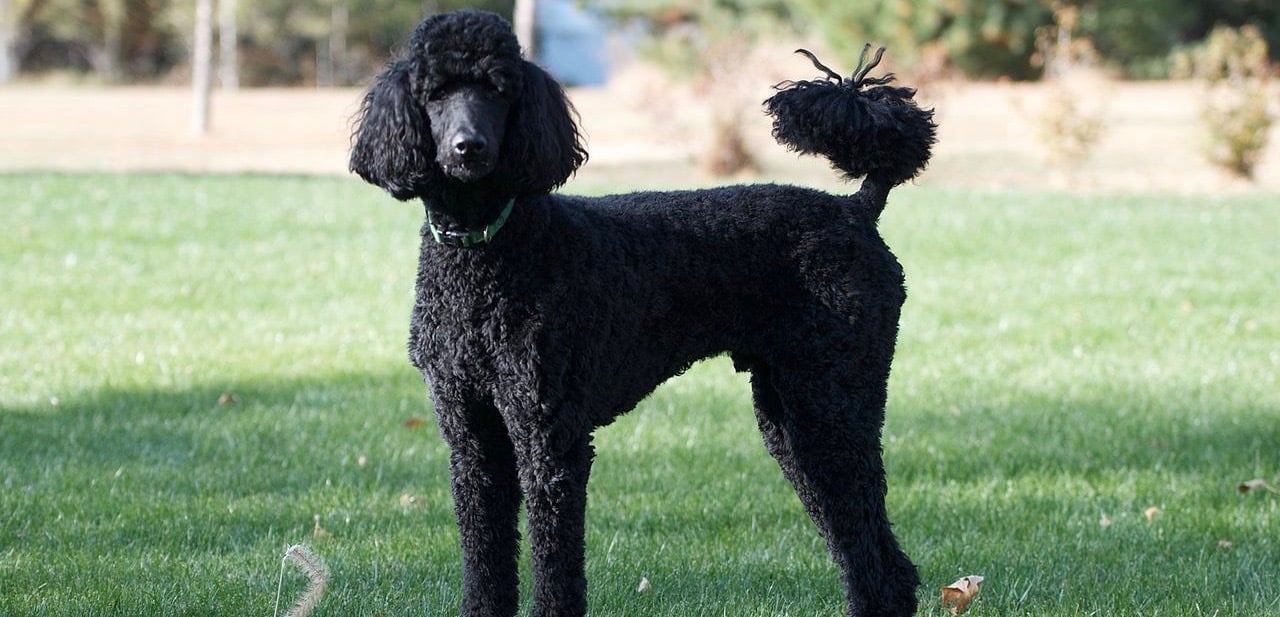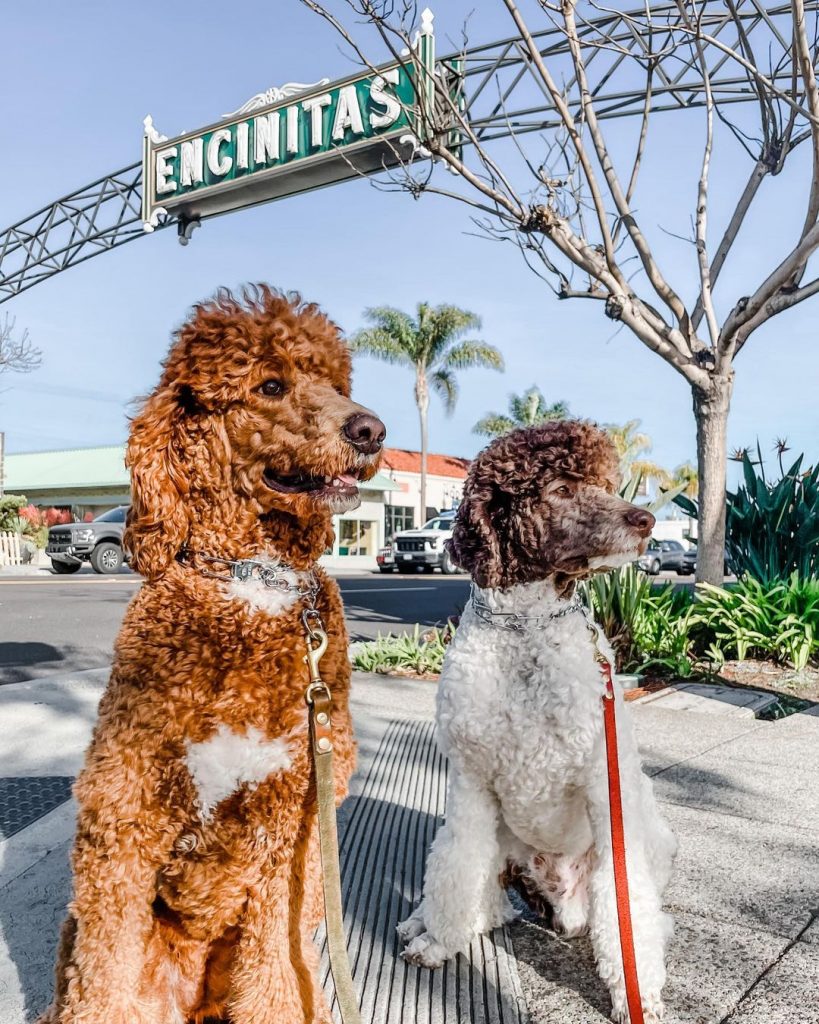
Poodles…whether you love them or don’t love them yet, they’re certainly hard to miss. Known mostly for their curly locks and bright personalities, Poodles have a rich history and much more to offer than just their looks or their undeniable brains. Read on to learn more about this popular dog breed, and let us help you decide if a Poodle dog is right for you.
Breed Characteristics
Key
- Low
- Medium
- High
- Origin: Germany
- Size:
- Weight: 18-32 kg
- Activity level:
- Barking/howling level:
- Good with dogs: yes
- Good with kids: yes
- Good with cats:
- Shedding:
- Shedding: Seasonal
- Grooming level:
- Training level:
Poodle Appearance

Besides their curls, long round ears, and a nice balanced look, you may have noticed different sizes of Poodle. But no matter the size (including the standard Poodle, the miniature Poodle, and the toy Poodle), they’re all the same breed.
Within this breed, you’ll see a wide variety of colourings, from solid colours like cafe-au-lait, black, silver, apricot, and brown to Poodles with a blend of colourings, including phantom and particoloured Poodles (one of which is called a tuxedo).
Side note: a Goldendoodle is not a colouring of Poodle, but rather a mix of Poodle and Golden Retriever.
Poodles all have that unmistakable dense, curly coat, but do you know what it’s for? They were originally bred and used as water dogs, and those curls are for more than just show. Their coat is water-resistant and acts kind of like a sweater to keep them warm, even in cold water. These dogs also have webbed toes, which act like flippers underwater.
Compared to other dogs, a Poodle has unique hair. They don’t have a double coat; instead, they have one single layer that barely sheds. This has led many to claim that Poodles are hypoallergenic, which may be close to the truth, but isn’t entirely the case. All dogs shed, at least a little, and for the severely allergic, any amount is a risk.
Poodle Personality
A typical Poodle is bright, energetic, and friendly. Although they can be standoffish with strangers at first, they’re quick to warm. Because they’re not particularly territorial, they make bad watchdogs and questionable guard dogs. However, when there’s a clear danger, they’ll protect their owners and families. For the most part, though, they’re quiet, calm, and alert, and act as a playful and perceptive companion to their owners and families.
Ideal Environment for a Poodle
Poodles are adaptable, and that means they’ll be happy in an apartment or a big home with a garden. As long as they have your love, and plenty of opportunities to play and exercise outdoors, they’ll do well. Take them to the park, and they’ll love playing catch with a ball. They also love hikes, especially if they end up in a lake to swim in.
If you share your home with others, Poodles also make great family pets. And when properly socialised, they tend to be very gentle with children. But be sure yours has a quiet place to retreat to when things get too hectic because these dogs are prone to over-stimulation.

Ideal Human for a Poodle
The ideal Poodle parent will be active and willing to spend lots of time playing and bonding with their dog. Providing plenty of opportunities for mental and physical exercise is a must.
Like many other dogs, they don’t like to be left alone, and they particularly love to be touched. The ideal human for this breed will be around the house more often than not, and just as affectionate as their curly-haired pet.
In a perfect world, a Poodle parent would probably work part-time, or from home, so they could spend maximum time caring for their pet. That said, enlisting the help of a trusted pet sitter or daycare provider can be a lifesaver for those days when you can’t fit in a daily walk.
Poodle Training
Is the Poodle the smartest dog? That’s up for debate, but they’re pretty close to the top. Like other smart dogs, they will learn commands quickly and want to move on to more advanced tricks. If you’re struggling to get their attention, a dog trainer can help decipher your Poodle’s motivation and teach you how to communicate more clearly with them.
Despite being easy to train, their intelligence also means that any harsh or punitive training won’t be well-received. Positive reinforcement is a much better approach. Keep training sessions short and fun, and make sure your Poodle gets plenty of stimulation to help prevent bad behaviour stemming from boredom.
A common frustration among Poodle owners is leash training their dogs. It’s important to start early with training your dog to heel and be sure to stop walking when your dog does something you’d rather they not do, and only start up again when they’re leaving enough slack in the leash for your taste.
On the bright side? While lead training can be difficult, toilet training tends to be a breeze, so count your lucky stars, Poodle parents.
Poodle Grooming
Grooming a Poodle might seem like a chore to the uninitiated, but as long as you’re not showing the dog, a short pet clip (or ‘puppy clip’) will keep you from having to comb too much.
In the show ring, adult dogs will need an official haircut, any of which will need extensive upkeep to prevent matting. Some show clips require the owner or groomer to spend around 10 hours per week on grooming. And some more elaborate hairstyles, including the rope-like locks of corded Poodles, take time and expertise.
If you’re like most Poodle owners, though, you’re not headed for the show ring. Instead, you’ll opt for a pet clip, which can be an easy DIY job with electric clippers, and you’ll only have to brush when things start to look a little tangled.
Poodle Health
Just like other dog breeds, the Poodle is more prone to certain health conditions. One of the most common is Addison’s disease (adrenal insufficiency), which can be managed with medication. Other health problems include bloat (gastric dilatation volvulus), thyroid issues, epilepsy, sebaceous adenitis, hip dysplasia, and, more rarely, von Willebrand’s disease. Many pet parents opt for pet health insurance, just in case.
Due to their long ears, they tend to get ear infections, so it’s recommended that you clean your dog’s ears regularly, and consult with your veterinarian about proper cleaning tools and techniques.
Poodle History
These dogs were originally bred in Germany and can be seen in art from as early as the 15th and 16th centuries. Their name comes from the German word pudel, meaning ‘to splash about’. There they worked as water retrievers from the 17th century onwards, helping hunters retrieve ducks and other waterfowl, and occasionally as retrievers in upland bird hunting. In addition to their roles as duck dogs, they have also worked as circus performers and truffle hunters.
The breed’s ancestry is disputed, with some saying they descended from a German water dog, and others believing the Poodle originated from the French barbet, possibly bred with a Hungarian water dog. But the general consensus is that they originated in Germany.
Many people associate Poodles with France, and, indeed, it has historically been a popular breed in France, prized as both water retrievers and truffle dogs. However, the colloquial term ‘French Poodle’ is mainly used to refer to dogs with a continental clip.
Getting a Poodle
Getting a Poodle is simple, but it’s important to be prepared. If you’re buying a puppy, you’ll spend plenty of time on basic obedience, socialising the puppy with other people and dogs, and teaching important skills like sleeping through the night and going to the bathroom outside.
Finding a puppy or adult dog can be as easy as an internet search, but be careful of puppy mills and internet scams. There are many ways to find a reputable breeder, and it’s good to ask around, visit before committing to payment, and trust your gut.
Poodle Adoption
Another way to find a Poodle dog is to adopt a rescue. Unlike puppies, rescues often come spayed and neutered, and with all their shots. Many rescues are surrendered by individual owners, and these dogs are likely to know basic commands and be socialised. If not, that doesn’t mean you can’t work with them. Contact a trusted dog trainer for more information on how to teach a dog who hasn’t experienced much structure, or how to help a dog who has been traumatised to feel safe and welcome.
Poodle Breeders
To find breeders who have to meet stringent requirements, it’s a good idea to look at those on the Kennel Club‘s assured breeder scheme and/or one with a five-star licence from the local council. When you visit a breeder, be sure to ask about any health issues in the dog’s bloodline, and discuss any genetic tests you might want to run.
Further Reading
Are you pining for more dog in your life? We’ve got plenty more for you:
